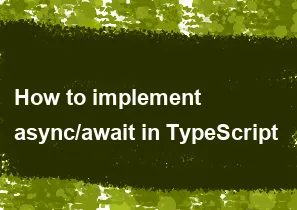How to implement async/await in TypeScript

In TypeScript, you can use the async and await keywords to work with asynchronous code. To implement async/await in TypeScript, you need to use functions that return promises and mark the function with the async keyword. Here's a basic example:
typescript// Example function that returns a Promise
function delay(ms: number): Promise<string> {
return new Promise((resolve) => {
setTimeout(() => {
resolve(`Delayed for ${ms} milliseconds`);
}, ms);
});
}
// Example function using async/await
async function asyncExample() {
console.log('Start');
try {
const result1 = await delay(1000);
console.log(result1);
const result2 = await delay(2000);
console.log(result2);
} catch (error) {
console.error('Error:', error);
}
console.log('End');
}
// Call the async function
asyncExample();
In this example:
- The
delayfunction returns a promise that resolves after a specified number of milliseconds. - The
asyncExamplefunction is marked asasyncand uses theawaitkeyword to wait for the promises returned by thedelayfunction. - The
try-catchblock is used to handle any errors that might occur during the asynchronous operations.
Make sure to set the target ECMAScript version to ES2017 or later in your TypeScript configuration to support the async/await syntax. You can do this by adding the following compiler options to your tsconfig.json file:
json{
"compilerOptions": {
"target": "es2017",
"lib": ["es2017"]
}
}
This ensures that the generated JavaScript code supports the async/await syntax.
-
Popular Post
- How to optimize for Google's About This Result feature for local businesses
- How to implement multi-language support in an Express.js application
- How to handle and optimize for changes in mobile search behavior
- How to handle CORS in a Node.js application
- How to use Vue.js with a UI framework (e.g., Vuetify, Element UI)
- How to configure Laravel Telescope for monitoring and profiling API requests
- How to create a command-line tool using the Commander.js library in Node.js
- How to implement code splitting in a React.js application
- How to use the AWS SDK for Node.js to interact with various AWS services
- How to use the Node.js Stream API for efficient data processing
- How to implement a cookie parser middleware in Node.js
- How to implement WebSockets for real-time communication in React
-
Latest Post
- How to implement a dynamic form with dynamic field styling based on user input in Next.js
- How to create a custom hook for handling user interactions with the browser's device motion in Next.js
- How to create a custom hook for handling user interactions with the browser's battery status in Next.js
- How to implement a dynamic form with dynamic field visibility based on user input in Next.js
- How to implement a dynamic form with real-time collaboration features in Next.js
- How to create a custom hook for handling user interactions with the browser's media devices in Next.js
- How to use the useSWRInfinite hook for paginating data with a custom loading indicator in Next.js
- How to create a custom hook for handling user interactions with the browser's network status in Next.js
- How to create a custom hook for handling user interactions with the browser's location in Next.js
- How to implement a dynamic form with multi-language support in Next.js
- How to create a custom hook for handling user interactions with the browser's ambient light sensor in Next.js
- How to use the useHover hook for creating interactive image zoom effects in Next.js